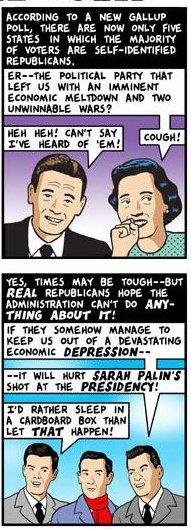Understanding transformation (and the current stimulus package debacle)

This Modern World by Tom Tomorrow, 2/3/2009. Frames 2 and 5.
When I was working for change in the H Street NE neighborhood, I had come to loggerheads with some people (mostly supporters of the H Street Community Development Corporation, but I didn't know this at the time) over pursuing historic preservation objectives as a revitalization strategy for the neighborhood. People would ask me, "can't you just compromise with them?" And I would reply, "it's not compromise if the only 'side' that compromises is mine."
The problem with working on a "bipartisan" agenda at the national level is that the same trends that put Barack Obama in the presidency made the Republican Party much more conservative in terms of their representation in the House and Senate. Bipartisanship isn't possible in such conditions.
Since the Lyndon Johnson Civil Rights initiative, conservative Democrats have mostly become Republican, and moderate Republicans have become Democrat, or at least drummed out of the power circles within the party. This has been pronounced over the past few elections where moderate Republicans have been for the most part, turned out of office, and replaced by Democrats.
So while the impetus behind the election of President Obama was transformational and hopeful, the simultaneous reaction for the people who didn't vote for Obama was business as usual, focused around the government as waste and tax cuts as the primary economic policy for the federal government.
And that's what we have going on right now with the conservative/Republican rhetoric against the stimulus package--much criticism is deserved, there's a lot of pork in the bill. At the same time, Democrats aren't doing a good job of defining how to act differently going forward. Frankly, they don't know how, and aren't really equipped to "think different" -- tax credit for buying a car anyone?
According to David Brooks, a Times columnist, in "The Gang System":
In the first major episode of his administration, the stimulus package, the conventional policies so far have won. The Obama administration sent a series of stimulus principles to Capitol Hill and allowed the Old Bulls in the House and Senate to write legislation. They produced sprawling bills that gathered dozens of traditional liberal ideas. The resulting bills would have been no different if Nancy Pelosi had been elected president, or Harry Reid, or any other conventional Democrat.
From "On the Edge" by New York Times columnist Paul Krugman:
A not-so-funny thing happened on the way to economic recovery. Over the last two weeks, what should have been a deadly serious debate about how to save an economy in desperate straits turned, instead, into hackneyed political theater, with Republicans spouting all the old clichés about wasteful government spending and the wonders of tax cuts.
It’s as if the dismal economic failure of the last eight years never happened — yet Democrats have, incredibly, been on the defensive. Even if a major stimulus bill does pass the Senate, there’s a real risk that important parts of the original plan, especially aid to state and local governments, will have been emasculated. ...
So what should Mr. Obama do? Count me among those who think that the president made a big mistake in his initial approach, that his attempts to transcend partisanship ended up empowering politicians who take their marching orders from Rush Limbaugh. What matters now, however, is what he does next.
It’s time for Mr. Obama to go on the offensive. Above all, he must not shy away from pointing out that those who stand in the way of his plan, in the name of a discredited economic philosophy, are putting the nation’s future at risk. The American economy is on the edge of catastrophe, and much of the Republican Party is trying to push it over that edge.
By doing such, there will be a repositioning of politics, comparable to how the organization of the political sphere changed with the New Deal, and then with Lyndon Johnson and the Barry Goldwater Republican response, which culminated with the election of Ronald Reagan and then the classic overreach by George W. Bush.
For the good of the country, transformation, not "bipartisanship" is required.
Labels: change-innovation-transformation, federal policies and the city, progressive urban political agenda



0 Comments:
Post a Comment
<< Home